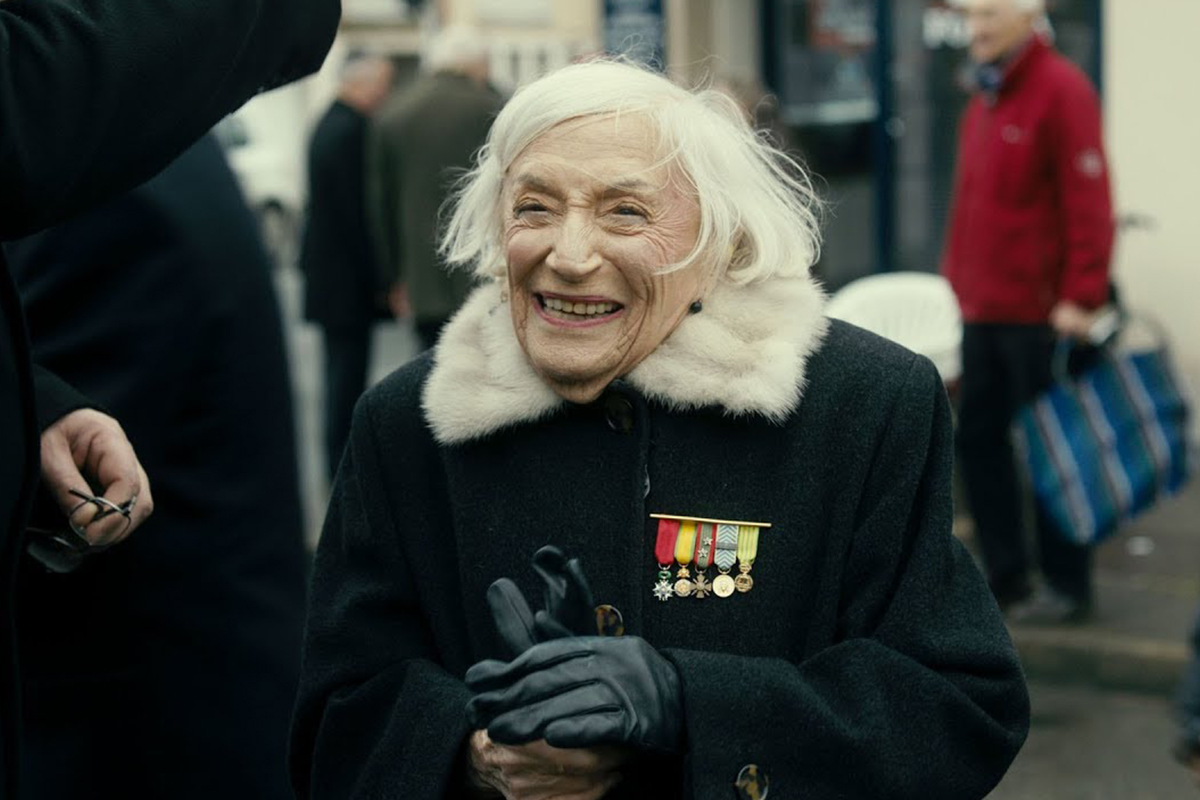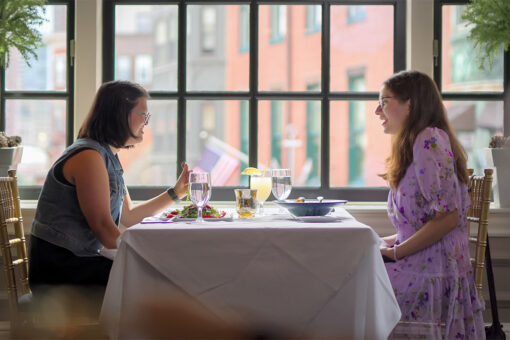Last week, there was a 100th birthday celebration in Los Angeles. Marthe Cohn sat in her driveway with a banner behind her, and a face mask on, as cars drove by to wish her well.
It wasn’t an ordinary birthday party, but Marthe Cohn is no ordinary woman — she is a Holocaust survivor and former French Jewish spy who went behind Germany enemy lines and is decorated with the highest honors of the French military.
Marthe Cohn was born Marthe Hoffnug in Metz, France, on April 13, 1920. She was one of seven children in her Orthodox Jewish family. They lived on the border of France and Germany, so the family aided Jewish refugees on the lam.
“There was antisemitism in Metz, but very low-grade,” Marthe recalls. “In September 1939, before the war started, the French government demanded that the people who could afford to do so move to Poitiers [400 miles to the southwest]. My two brothers were in the French army; my oldest brother was on the Maginot Line and my youngest was in Tunisia, where he was doing his service, until 1940, then he was sent back because Jewish kids were not kept in the French army anymore. My oldest brother was taken prisoner on the Maginot Line. He was in a camp in Strasbourg, and he overheard the Germans say that the next day they were going to be transferred to a camp in Germany so he escaped that night and he was able to come home. He joined us in Poitiers in December 1940.”
“My sister, Stephanie, and I were helping a lot of people who wanted to escape to unoccupied France. We had the assistance of Noel Degout, a farmer in the small village of Dienne, near Poitiers, who helped thousands of people cross through his property, which was partially in both zones. He never asked for one penny and posthumously received the title of Righteous Among the Nations at Yad Vashem after they read my book.”
In June 1942, Stephanie was arrested and sent to Route de Limoges camp, a camp for foreign Jews in occupied France. “We were able to organize her escape from the camp, but she refused to escape because she told me that if she did, we would all be arrested, but the rest of us decided to escape from occupied France,” Marthe says.
Stephanie was then transferred to two other French internment camps, and then deported on Yom Kippur 1942 to an unknown destination — later, her family found out she had been sent to Auschwitz, where she was murdered.
After Stephanie’s arrest, Marthe and her family escaped occupied France with the help of a city hall employee: “He told me that he could provide us with identity papers without the stamped ‘Jew.’ When I asked him how much it would cost, he started crying and he said, ‘I do not want to be paid. I do this to save you.’ He gave me all the identity cards.”
They first went to Arles, to join two of her brothers, then Marthe went on to Marseille to finish her nursing studies. After completing her studies, she went to live with her sister, Cecile, in Paris in September 1943. Paris was liberated in August 1944 — and Marthe immediately tried to join the army. In November 1944, she joined the French Army as a nurse, but was soon transferred to the army’s intelligence service. She was nicknamed Chichinette, for “little pain in the neck.”
She tried 13 times to cross the front; on the 14th try, she crossed the border into Germany and took up a cover identity of a German nurse searching for her missing fiancée. She was 24 years old, and 4 foot 11 inches tall.
“I had no idea what I was getting myself into,” Cohn said. “I’m not a liar or an actor, but when your survival depends upon it… I did it for what Germans had done to us.” She spent three weeks in Germany, on the front lines, as the war was winding down.
Thanks to her covert mission, Marthe reported two critical pieces of information to the French intelligence: one, northwest of Freiburg, the Siegfried Line had been evacuated and two, the location of where the German army laid in ambush in the Black Forest. In 1945, the French Army awarded Marthe the Croix de Guerre, a French military decoration.
Yet, after the war ended, she didn’t talk about what happened. “I always felt that people wouldn’t believe me. They would think it was tall tales,” Marthe said.
In 1999, many years later, her children and grandchildren finally found out what she did during the war when the French government awarded her the Médaille militaire — the third highest award of the French Republic. In 2002, she was awarded the title of Chevalier de la Légion d’honneu, the highest French order for military and civil merits, and in 2006, she was again honored with the Medaille of the Reconnaissance de la Nation.
Germany also later awarded her The Cross of the Order of Merit, Germany’s highest honor.
“When I found out in Germany some very important information, I had no idea that the German government would one day reward me with the highest award of Germany because they felt that my information had shortened the war, and I saved a lot of German lives. I helped them get rid of the Nazis … which is unbelievable. The president of Germany, Mr. [Frank-Walter] Steinmeier, and his wife invited my husband and I for tea in their castle in Berlin last year.”
A new documentary, The Accidental Spy tells her story:
The film, directed by Nicola Alice Hens, is streamable on Kino Now, where you can rent it for $4.99. Marthe also co-wrote a memoir in 2002, Behind Enemy Lines: The True Story of a French Jewish Spy in Nazi Germany.
As she said earlier this year, it is important for everyone to hear stories of the Holocaust — especially young students. “They all have very short memories, and they don’t know enough about the Shoah. If they don’t know about what happened in the past, they cannot prepare for the future. Impossible.”
Her advice for young people? “Be engaged and do not accept any order that your conscience cannot approve of. These are the two [pieces of] advice I give children. If they follow this advice, they will be okay.”
Happy 100th birthday, Marthe. May you live many, many more years.



